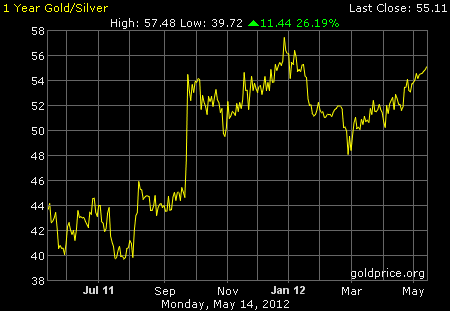Mexico Purchased 110 Tons Of Gold That Don’t Exist?
By Avery Goodman | Seeking Alpha
Back on March 9, 2009, I devoted an entire article to a discussion of the unallocated precious metals storage schemes that are being marketed by LBMA member banks. As explained in more detail in that article, both small investors and large institutions have been “purchasing” what they think are precious metals, but ending up paying banks to “store” vault air.
To make matters worse, Jeffrey Christian, a gold market analyst who has often worked for bullion banks, testified at a CFTC hearing on March 25, 2010, and let it slip that the LBMA banks have only about 1% of all the physical gold they’ve allegedly “sold” and “stored”, after you add up both the derivatives they’ve issued, and the unallocated storage schemes. This means that if more than a few percent worth of the owners of the unallocated gold ever demanded delivery at the same time, they would get nothing. The same is true in the silver market.
A few months ago, the business news headlines were filled with stories about the “purchase” of large tonnages of gold by emerging world central banks. Among these banks was the Bank of Mexico, which supposedly purchased 110 tons over a very short period of time. To those of us who observed the market closely, those alleged purchases never seemed to have any impact, and the market seemed completely led by private buying interest and nothing else. This was very strange given that such huge purchases were supposedly made. The price of gold did go up quickly, but it in a way that did not seem to involve emerging market central bank purchases at all.
Recently, the tireless work of a Mexican journalist, Guillermo Barba, may have provided the answer to this conundrum. He posed a number of questions to the Mexican Central Bank about the gold purchases. Initially, what was probably middle management people at the bank refused to answer. They claimed that the bank needed to keep such matters secret. However, Mr. Barba is apparently very persistent and, finally, after pushing up the ladder, they gave him the answers he sought.
They were unable to provide the number of bars purchased, the bar numbers, the exact weight of each bar, or any other measures that would indicate, to someone familiar with the gold industry, that certain specific bars were titled in the name of Banxico. Instead, the bank finally admitted that:
The gold that composes the reserve in question is made up of bars that may have a minimum and maximum of gold. The bars with minimum content weigh approximately 10.9 kilos, while those with maximum content have an approximate weight of 13.4 kilos. The information is published by the London Bullion Market Association. … Due to the variability of the content of gold in the bars, it is not possible to specify with certainty the exact number of bars purchased.
It is possible that the people who orchestrated the deal are embarrassed by what seems, at first glance, to be incompetence. That is probably why they claimed secrecy at first. But, in truth, they have nothing to be embarrassed about. Only trained lawyers, gold dealers, analysts and others familiar with precious metals would know enough to realize that unallocated storage is a scam designed to print profits out of thin vault air.
By entering into such arrangements, the Bank of Mexico has become an unsecured creditor of the bullion bank that sold them on the deal. Like so many other institutional and private investors, Banxico has made the mistake of trusting the London bullion bankers. It was duped into buying what is essentially an unsecured “bond” giving a claim not on gold, but rather, merely upon the general assets of the selling bank.
Banxico clearly does not know what it has bought. It is almost certain that neither legal title nor the actual bars of gold have been transferred to Mexico. Thankfully, the issue is now out in the open. As a result, I have no doubt that when top Mexican banking officials cross examine the London bankers about this a show will be privately made to assure the Mexicans that delivery can be made at any time. But a number of gold bars could be shown to them, including bar numbers, weights, etc., even though the bars also have other claims on them.
The only way to be sure of ownership is to take physical delivery, and as a central bank, Banxico should certainly do that. Mexico should tolerate nothing less. Once it is clear that someone has misled you, you don’t give them a second chance if you’re smart.
Selling imaginary gold to an emerging market central bank in a quasi-fraudulent unallocated storage scheme is a gutsy move. By doing so, the bullion bank defeated the very purpose for which the Bank of Mexico was buying the bullion. Instead of owning a valuable asset (gold), free of counter-party risk, Mexico owns nothing. It appears to merely be an unsecured secured creditor of a London mega-bank that is probably insolvent like most of them.
Many of the LBMA banks were kept alive solely by the grace of bailouts from their headquarters’ national government. If one of these banks eventually does officially go belly-up, they will all go belly-up, and Mexico’s gold will be lost forever.
The inability to provide an exact numbers of bars, individual bar numbers, weights and measures makes it almost certain that Banxico has unwittingly gotten itself involved in unallocated storage. They now own nothing more than a gold “bond” issued by a commercial bank. They have been tricked into buying a debt instrument that will never pay one penny in interest. They’ve been sold a “pig in a poke”. But, with the top Mexican officials now aware of the issue, we can presume that they will overcome any embarrassment. Mexico will be correct in demanding that all physical gold bars be immediately identified and delivered into a vault in Mexico City. This demand should be made before the European Crisis gets any worse and before the default of Greece or the demise of the Euro.
> Read the full article from source
-
Related Articles:

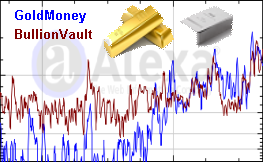
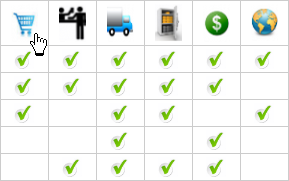
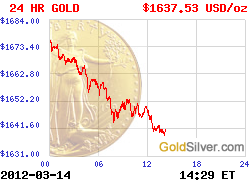
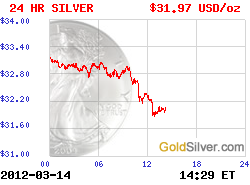
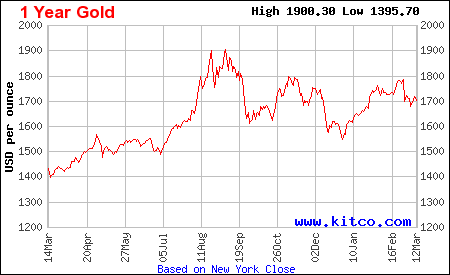 More Charts: 1-Month, 1-Year, 5-Year, 10-Year
More Charts: 1-Month, 1-Year, 5-Year, 10-Year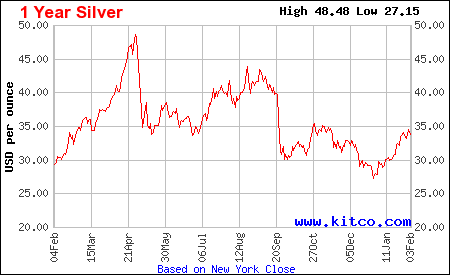 More Charts: 1-Month, 1-Year, 5-Year, 10-Year
More Charts: 1-Month, 1-Year, 5-Year, 10-Year